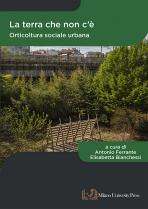Keywords:
soilless cultivations, urban cultivation, social involvement, contaminated soils, social design, community design participation, active citizenship, solidarity circular economy
Synopsis
The book describes an action-research project aimed at responding to the needs generated by new forms of poverty, both social and economical, laid bare by the Covid Pandemic in Via Padova Area, in Milan. This area, a multi-ethnic neighborhood in the periphery of the ‘City of the Rich’, is marginal in the Greater Milan. As a response to this state of crisis, relying on a solid territorial network of third sector entities, “La terra che non c’è” – The Unexisting Land, – has used a series of abandoned, underused or inactive lands, to produce fresh food, with the scientific coordination of the Department DISAA – University of Milan. By applying soilless cultivation tecniques, it has created self-built vegetable gardens, managed with the inhabitants of the neihbourhood. “La Terra che non c’è” - The Unexisting Land has therefore built an innovative urban horticultural community, made up of young students, voluteers, the elderly, the disabled, which donates its products to those who are socially in need, to the invisible people of the neighborhood, thus creating a supportive circular community.
Downloads
Download data is not yet available.
Author Biographies
Antonio Ferrante
is Full professor at the Department of Agricultural and Environmental Sciences of the University of Milan in the Vegetable and Floriculture science. His lectures are related to greenhouse crops and vegetables cultivation. The main research topics concern the evaluation of the quality of horticultural products at harvest and post-harvest, the optimization of the nutrition of crops grown in innovative hydroponic systems in greenhouses or simplified soilless systems for urban areas, the characterization of biostimulant products and evaluation of their efficacy in mitigating the effect of abiotic stresses. Antonio Ferrante is the President of the Italian Society of Horticultural Science (SOI). The results of research activities are published in more than 200 scientific and technical publications.
Elisabetta Bianchessi
founded in 2014 T12-Lab in Milan, a cultural association and research-action agency, specialized in projects with fragile communities. Since 2012 she is Honorary Member of Liveinslums NGO, as scientific manager of environmental cooperation, landscape design and urban horticulture projects in African megalopolises. Since 2021, she is Adjunt Professor in Community Design, Master of Arts in Social Design (En) at NABA, Nuova Accademia Belle Arti di Milano. Elisabetta Bianchessi created and directed the Master Paesaggi Straordinari in Landscape Design - Public Art of Politecnico di Milano and NABA Nuova Accademia Belle Arti Milano (2008 - 2013); she created and directed the International Summer School for the Bergamo Landscape and Garden Institute of the University of Bergamo, (2014 - 2018).
Previously she has been teaching landscape and public space design at numerous institutions. In relation to social design she has been Adjunt Professor at the Politecnico di Milano, Faculty of Architecture (2003-2013); she taught at the Master World Natural Heritage Management-Unesco Trento, of the Autonomous Province of Trento in collaboration with the University of Turin (2013-2017). Architect with honors (at Politecnico di Milano - Faculdade de Arquitectura Lisboa - Escuela Tecnica Superior de Arquitectura de Madrid) and PhD in Architectural Design with honors (at Escuela Tecnica Superior de Arquitectura de Madrid - Escola Tècnica Superior d'Arquitectura de Barcelona).
Copyright (c) 2023 Authors, Milano University Press


